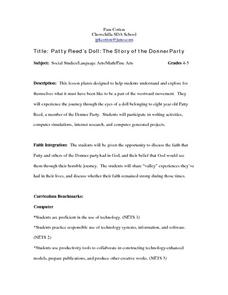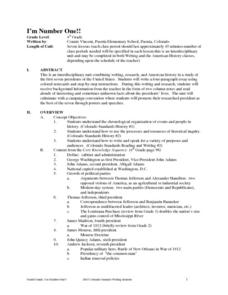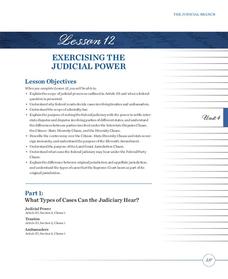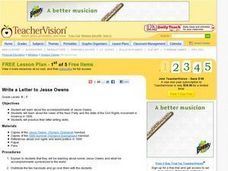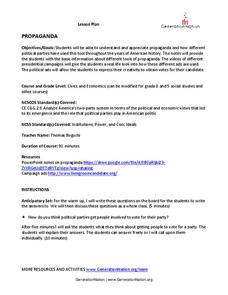Curated OER
CANDIDATE COMPARISON
Students identify the names of major contemporary political parties. They explain why a person might choose to vote for one candidate for President of the United States over another candidate. They identify the two major political...
Curated OER
Federal Court Systems and Court Cases
Ninth graders investigate the basis for the Common Law Tradition. They examine the organization of the Federal Court System and students identify the various sources of the American Law.
Curated OER
ONE VOTE
In order to understand the political process and the importance of voting, pupils will construct a class time line. They will group up and research a specific era, creating a time line of political events where one vote made a...
Judicial Learning Center
The Judge and the Jury
Unless you are a lawyer, you might not understand just how unrealistic Law and Order and other legal dramas actually are. Here's a great resource to help scholars of criminology gain a more realistic perspective. The lesson outlines the...
Curated OER
Bleacher Dance - Adding to School Spirit
Looking for some moves to do in the bleachers while at a school sports event? This lesson teaches two sets of 32-counts. The moves can basically be done while standing up in the bleachers!. The amount of movement will be determined by...
Curated OER
Card Catalog Cards
Prepare students on how to use the library's card catalog system as well as the online version. Author, card catalog, the Dewey system, and so much more is addressed. This would be a great tool to use in the classroom or library.
Curated OER
Getting Started with the TI-Navigator™ System: What's My Rule?
Young scholars explore linear relationships. In this sixth through eighth grade mathematics activity, students explore the symbolic representation of verbal descriptions of mathematical rules defining the relationship between two variables.
National First Ladies' Library
So! You Want to Start Your Own Political Party?
Students examine the emergence of third parties in American politics during the first half of the 19th century. Working in groups, they research a Third Party and determine why the party was founded as well as who were instrumental in...
Curated OER
Gilded Age Politics
Whisk your students through the politics of the Gilded Age with this presentation, which features the contexts and characteristics of the 1880-1888 Presidential Elections. Clever political cartoons and clear, concise bullet points about...
The New York Times
A Guide to Political Donations
Voters determine the outcome of elections, but campaign donors can influence the attitudes of those voters. Explore nine examples of donors and the amounts of money they want to contribute, and the legal ways the groups can or cannot...
Curated OER
Proportional Representation: A Fairer Voting System?
Tenth graders work as a grade to conduct a mock election. They tally votes in two different systems and discuss if proportional representation or straight counting of votes leads to a fairer outcome.
Curated OER
Patty Reed's Doll: The Story of the DonnerParty
Students explore westward movement through eyes of doll belonging to Patty Reed, member of Donner Party. They write journal entries from points of view of characters in book, Patty Reed's Doll, participate in Pack the Wagon game, and...
Curated OER
I'm Number One!
Fourth graders complete a unit of lessons on the first seven presidents of the U.S. They conduct research, write a four-paragraph essay, and create posters and speeches for a simulated campaign convention.
Curated OER
Solving Systems by the Elimination Method
Pupils solve equations by elimination and use the TI to graph the lines and find the point of intersection.
Heritage Foundation
Exercising Judicial Power
We should all do more exercising, but should the judicial branch as well? High schoolers develop their understanding of what powers the judicial branch carries because of the US Constitution, as well as where their limits lie in the...
Bully Free Systems
Bully Free Lesson Plans—Seventh Grade
Having a hard time defining bullying with your seventh graders? Discuss the different types of behavior one would see in a bullying situation with a series of lessons, worksheets, and group activities.
Curated OER
The Presidential Nominating System
Students examine the process by which candidates for U.S. president are nominated by the Democratic and Republican parties. They identify the differences between primaries and caucuses and key terms and issues related to the primary...
Curated OER
Write a Letter to Jesse Owens
Pupils examine the accomplishments of Jesse Owens and the views of the Nazi Party in 1936. They read and discuss two handouts, conduct research on the Nazi Party's views and the Civil Rights Movement in American in 1936, and write a...
Curated OER
Political Parties
Twelfth graders give their current events presentations to the class today. After completing the "T" exercise on classifying certain individuals as Democrats or Republicans, they pair up to figure out where the political parties fit into...
Curated OER
Delegating Authorities
Students compare and contrast democracies around the world after reading a New York Times article. They create posters and participate in a "democracy roundtable" in which they discuss two democracies.
Generation Nation
Propaganda
How does propaganda influence our vote? Through grand conversation, scholars gain information about what is and how to identify the different ways propaganda is used in a presidential election. Using their new-found knowledge, citizens...
Alabama Department of Archives and History
Cells for Sale - Convict Leasing in Alabama
The benefits and drawbacks of convict leasing following the Civil War are the focus of a lesson that asks groups to examine primary source materials to gain an understanding of the program before individuals decide whether they are in...
Core Knowledge Foundation
Genetics and the Master Race
How did the beginnings of genetic research influence the Nazi party? A thorough, engaging unit incorporates the work of Gregor Mendel, the study of inherited traits, and the use of racism and discrimination during the Holocaust.
Federal Reserve Bank
Prices: The Marketplace’s Communication System
Explore the dual role of prices as signals and incentives, and discover how prices are determined by buyers and sellers in the United States economy.













